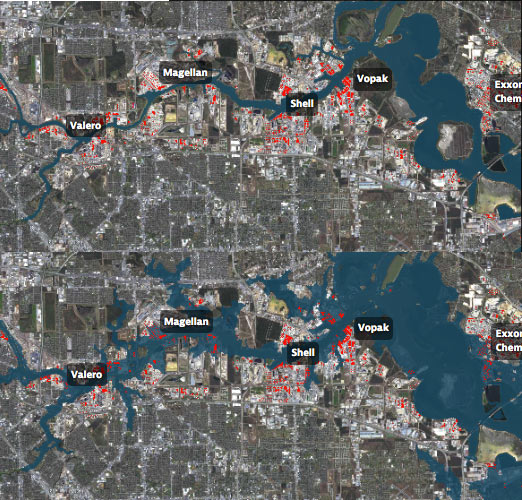WAIT, DID THE 2008 RECESSION UP THE CHANCES OF A FUTURE HOUSTON CHEMICAL CATASTROPHE?  Roy Scranton imagines “a wave of water sweeping toxic waste into playgrounds, shops and houses” in Magnolia Park in his op-ed this morning, written after touring the Ship Channel and speaking with the local A&M and Rice research teams pushing for variations on a series of region-scale coastal barriers to hunker down behind whenever the next gigantic hurricane hits the Houston region, in hopes of avoiding deadly flooding and catastrophic chemical spills. But the researchers tell Scranton that pushing for federal and state funding for a response is a slow endeavor; Jim Blackburn (a main player on the Rice team) tells Scranton that he’s “heard more than one person say our plan is to wait until the next hurricane comes, then depend on guilt money from Washington to fix the problem.” Scranton writes that the best chance for that guilt money so far might have been in 2008, when Hurricane Ike landed just 30 miles northeast of the zone that modelers say could have caused thousands of deaths and irreparable ecological devastation to the area, on September 13th — 2 days before the Lehman Brothers filed for bankruptcy, pulling global attention and national funds to other issues as markets began to crash. [NY Times; previously on Swamplot] Model maps of potential storm surge flooding along the ship channel, with chemical storage marked in red: Texas Tribune
Roy Scranton imagines “a wave of water sweeping toxic waste into playgrounds, shops and houses” in Magnolia Park in his op-ed this morning, written after touring the Ship Channel and speaking with the local A&M and Rice research teams pushing for variations on a series of region-scale coastal barriers to hunker down behind whenever the next gigantic hurricane hits the Houston region, in hopes of avoiding deadly flooding and catastrophic chemical spills. But the researchers tell Scranton that pushing for federal and state funding for a response is a slow endeavor; Jim Blackburn (a main player on the Rice team) tells Scranton that he’s “heard more than one person say our plan is to wait until the next hurricane comes, then depend on guilt money from Washington to fix the problem.” Scranton writes that the best chance for that guilt money so far might have been in 2008, when Hurricane Ike landed just 30 miles northeast of the zone that modelers say could have caused thousands of deaths and irreparable ecological devastation to the area, on September 13th — 2 days before the Lehman Brothers filed for bankruptcy, pulling global attention and national funds to other issues as markets began to crash. [NY Times; previously on Swamplot] Model maps of potential storm surge flooding along the ship channel, with chemical storage marked in red: Texas Tribune





When the hurricane hits and we all know it will, every public official from feds on down should be charged with murder and environmental terrorism and be hanged from “the ol hanging tree” @ bayou place. The idea that in a country that grossly over pays politicians and CEOs that there isn’t enough money to protect human life and the environment is asinine. But probably even more inept than that is we will go to the ballot box to fund pension funds, build high school football stadiums, argue over tearing down the Dome and who can urinate and deficate in a restroom but we can’t find the will, time or courage to put the safety of millions of people on the ballot? Who are these people, aliens committed to the destruction of mankind? Idioticy is the new norm and we blindly support it.
Jack up their insurance rates. It costs ~15 million to built a suitable berm around a 250 acre property along with pump station. Insurance has killed several projects i know of due to the risk of being in a flood prone area.
@SimplySid: It isn’t idiocy, it’s greed. Fixing the problem costs money. That money has to come from somewhere. No one who has it wants to give it up.
This country has sunk to a low level, with little chance for survival, when people wanting to keep the money they have are accused of “greed”, per Memebag.
Alicia hit Houston head-on in 1983 and the world did not end. At that time there were fewer environmental regulations and enforcement, and most of those same plants were operating minus the 35 years of technological development we know today. The chances of a Cat 4 or 5 making the ‘perfect’ strike on the Ship Channel are much smaller that people think. Most storms are Cat 3 and below, and all storms have a fairly narrow cone of worst destruction (as demonstrated by Ike and Rita). A giant anti-storm wall sounds like a good idea but would cost a crap-load of money that would just come from debt slapped on to the next generation of Americans. I agree that the idea of “guilt money” is a symptom of systemic failure in our democracy. We wait for catastrophe then throw money at it afterwards in a knee-jerk manner. But that does not mean that throwing money around before a catastrophe would be well-spent or give us the best bang for our buck. There needs to be a lot of deliberation on risk vs. cost, as well as the other needs – our country is on the path to learning you cannot spend money on every need all the time. At some point our ability to borrow will run out and we will have to prioritize and limit expenses based on income, just like a normal budget.